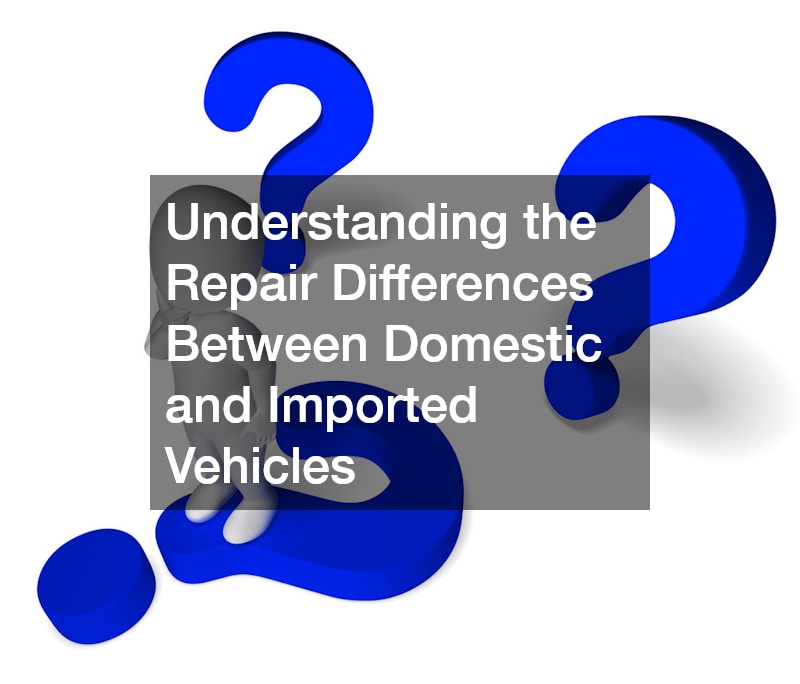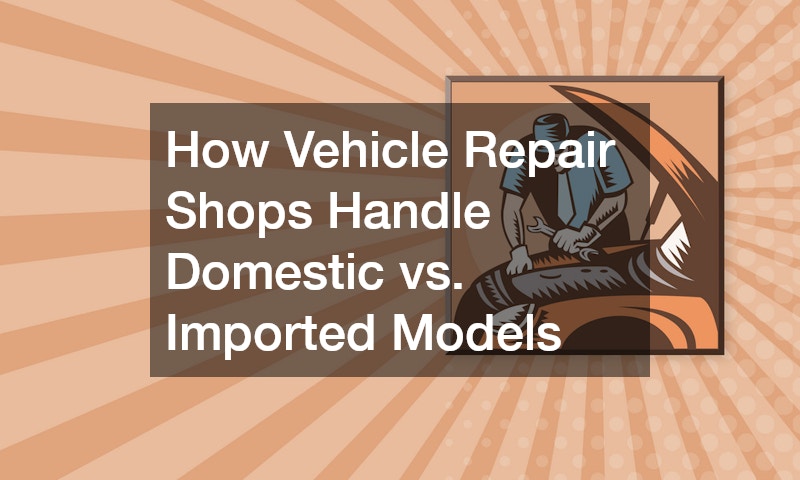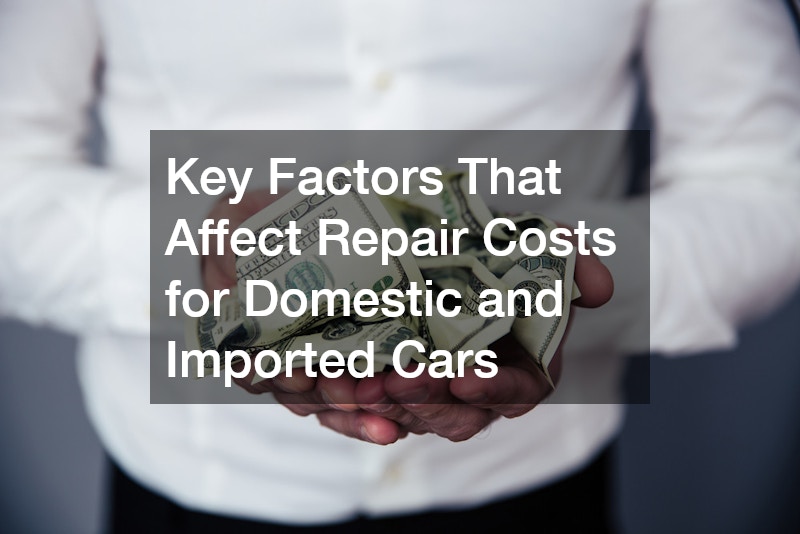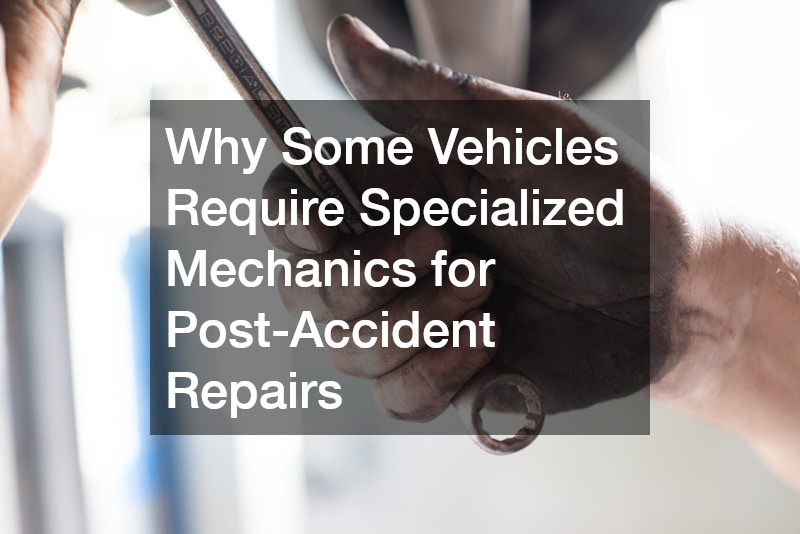When dealing with vehicle repairs, understanding the nuances between domestic cars vs foreign cars is essential for all car owners. Repair challenges can vary significantly depending on whether you own a domestic or an imported vehicle. This article will dive into the distinctive repair processes, costs, and insurance considerations for domestic and imported cars, offering valuable insights into how to handle these situations efficiently.
With a refined focus on collision repair and insurance claims management, our exploration aims to equip vehicle owners with a clearer understanding of the landscape. Whether you own a domestic car or frequently visit a Lexus autobody shop for your import needs, being knowledgeable about these differences can help streamline repairs and save costs. From dealing with repairs at specialized auto body shops to navigating insurance claims, each step requires a keen understanding of the issues involved with domestic cars vs foreign cars.
This long-form article will provide guidance for vehicle owners, guiding them through the intricacies of repair and insurance considerations. It will delve into the structural and logistical differences between domestic and imported vehicles, examining why these variances exist and how they impact repair experiences. By the end of this read, you’ll be better prepared to make informed decisions regarding your vehicle repairs and insurance claims.
Understanding the Repair Differences Between Domestic and Imported Vehicles

Domestic cars vs foreign cars have always presented different challenges and opportunities in terms of repair. American-made vehicles often benefit from the advantage of proximity, meaning parts and expertise are generally more readily available. This accessibility can potentially lower both the costs and wait times associated with repairs at an auto body shop.
In contrast, foreign vehicles, especially those manufactured in countries like Germany or Japan, often require a specialized approach. The intricacies involved in repairing imported vehicles stem from the unique engineering and parts specifications that may not be as easily obtainable. This scenario often necessitates a visit to a German car mechanic or a specialized repair shop.
Ultimately, understanding the repair differences between domestic and imported vehicles can aid car owners in anticipating the potential challenges they may face. This comprehension not only assists in making proactive arrangements but also allows for a more informed discussion with automotive professionals regarding domestic cars vs foreign cars.
How Vehicle Repair Shops Handle Domestic vs. Imported Models

Auto body shops often have to adapt their services to cater to both domestic cars and foreign cars. Generally, for domestic vehicles, parts are sourced quickly, enabling repair shops to handle repairs more efficiently. This is crucial for customers who require rapid service, such as when dealing with collision repair needs after an accident.
Imported vehicles, however, necessitate a different approach, often requiring a repair shop to have access to import-specific diagnostic tools and expertise. Shops like a Lexus autobody shop may have specialized knowledge and technology tailored to the nuances of specific imported models. This specialized handling ensures that the vehicles are returned to their original condition as closely as possible.
The complexity involved in repairing domestic cars vs foreign cars underscores the importance of selecting a repair shop with the requisite experience and tools. Whether dealing with auto accessory adjustments or comprehensive accident repairs, the right choice in repair facilities can significantly affect the final outcome.
Key Factors That Affect Repair Costs for Domestic and Imported Cars

The cost of repairing domestic cars vs foreign cars hinges on several factors, each playing a significant role in the total expenditure. For domestic vehicles, factors such as the availability of parts and general maintenance considerations typically contribute to a lower cost profile. Domestic auto body shops and collision repair facilities often have easier access to the necessary parts and equipment.
Conversely, imported vehicles can incur higher repair costs primarily due to the scarcity and expense of parts. The intricacy of foreign car designs sometimes necessitates the input of a German car mechanic, raising labor costs significantly. Additionally, there may be shipping costs involved with importing parts, adding another layer of expense to the repair process.
Understanding these financial dynamics between domestic and foreign cars can be crucial for owners as they budget for potential repairs. Engaging with home and auto insurance services can also aid in mitigating some of these costs, especially in post-accident scenarios where insurance coverages differ.
Why Some Vehicles Require Specialized Mechanics for Post-Accident Repairs

Accidents can highlight the necessity for specialized mechanics, particularly when dealing with imported vehicles. These cars often exhibit complex technology and nuanced engineering that domestic mechanics may not be familiar with. Consequently, an intricate collision repair may necessitate the skill of a specialized German car mechanic or a technician well-versed in the specific manufacturing style.
Domestic vehicles can also sometimes require specialized attention, particularly when fitted with customized auto accessories. A car equipped with advanced technology or luxury modifications might demand specialized knowledge for accurate repairs to be effected after an accident. These facilities often exist within recognized auto body shops that have invested in specialized skill sets and equipment.
Consequently, when assessing repair needs for domestic cars vs foreign cars, the availability of specialized mechanics and tools can be decisive. Owners should ensure their chosen repair shop has the experience and expertise to handle their vehicle’s specialized repair requirements effectively.
Navigating Insurance Claims: Repairing Imported vs. Domestic Cars After an Incident
The insurance landscape is another crucial area where the differences between domestic cars vs foreign cars become apparent. Navigating insurance claims can be more straightforward for domestic vehicles due to the relative simplicity of parts acquisition and repair procedures. Home and auto insurance service providers often have pre-existing agreements with domestic auto body shops which can expedite the claims process.
Conversely, imported vehicles can face a slightly more prolonged process, primarily due to the need for specialized repairs and potentially higher costs. Insurers may require further confirmation of repair estimates, often needing an assessment from a specialized shop like a Lexus autobody shop. This additional verification step can extend the processing time, impacting repair timelines.
Understanding these insurance nuances provides vehicle owners with a roadmap to effectively manage the claims process. By identifying repair facilities with experience in handling insurance claims for imported cars, owners can effectively articulate their needs for home and auto insurance services, ensuring a smoother claims experience.
Choosing the Right Shop: Factors to Consider When Repairing Your Imported or Domestic Vehicle
Selecting the right repair shop is pivotal, whether dealing with domestic cars vs foreign cars. For domestic vehicles, an auto body shop with a strong local reputation and robust relationships with parts suppliers may offer the most efficient and cost-effective repairs. These shops often have familiarity with the local car models and access to parts that streamline repair processes.
When dealing with imported vehicles, the selection process can become more intricate. Import vehicle owners need shops that possess specific expertise and equipment tailored to their vehicles’ technology and engineering. For instance, owners of a German car might benefit from seeking out a German car mechanic rather than a general auto body shop.
Ultimately, prioritizing shops that exhibit both reliability and specialization can significantly enhance repair experiences. Checking reviews, certifications, and insurance partnerships can further aid vehicle owners in making an informed decision regarding the right repair facility for their needs.
Differences in Towing and Handling After an Accident: Domestic vs. Imported Vehicles
Handling and towing protocols post-accident reveal yet another layer of distinction between domestic cars vs foreign cars. Domestic cars may benefit from a more extensive network of towing services readily equipped to handle common models. The availability and familiarity often facilitate a more streamlined accident towing service that minimizes delays in getting the car to auto body shops for repairs.
Imported vehicles, on the other hand, might require specialized accident towing services, equipped to handle their unique specifications and weight distributions. This necessity can elongate the process, as not all towing services are equipped or authorized to handle sophisticated foreign car models.
Ensuring that your chosen repair shop or towing service understands the nuances of handling your vehicle is vital in these situations. This assurance can help prevent further complications or delays when transporting the vehicle for repair, ensuring a smoother post-accident recovery for both domestic and imported car owners.
How Vehicle Type Influences Repair Time and Costs Following a Collision
The type of vehicle significantly influences both repair time and costs after an accident. Domestic vehicles generally enjoy faster repair times due to simpler logistics surrounding parts and repair processes. The ease with which these vehicles are serviced can reflect in lower repair costs, which can be beneficial when dealing with collision repairs.
In contrast, the intricacy of imported cars often extends repair timelines due to the need for specialized parts and expertise. These requirements can incur higher expenses as well, as repair facilities like a dedicated Lexus autobody shop need to meet specific standards to ensure quality service. The costs associated with these professional services and specific parts might push up the overall expense incurred.
Understanding these implications plays a crucial role in managing expectations and preparation following a vehicle collision. By analyzing repair timeframes and anticipated costs, vehicle owners can make informed decisions regarding repair workshops and potential insurance claims associated with domestic cars vs foreign cars.
The Impact of Vehicle Make on the Process of Selling Damaged Cars
The vehicle’s make also significantly influences the process of selling junk cars or damaged vehicles. Domestic cars typically see a higher resale and salvage interest, given their commonality and parts availability. This prevalence often ensures that auto body shops and repair facilities can utilize parts or repair them for future use.
However, foreign cars, although perhaps less frequent in junkyards, may carry a higher resale value due to the demand for imported parts. The novelty and quality associated with brands often translate into parts salvage, enhancing overall resale opportunities even when damaged. Specialized repair shops often seek such models for restoration or parts extraction.
Navigating the decision to sell junk cars requires a thorough understanding of the make’s market dynamics. Vehicle make impacts not only market value but also potential buyer interest in the parts and rebuild potential of both domestic cars vs foreign cars.
Specialized Repair Needs for Imported Vehicles: Why They Need Unique Expertise
Imported vehicles frequently necessitate repair expertise beyond that required by domestic counterparts. The sophisticated engineering aspects present in foreign models mean that specialized knowledge and equipment are crucial for effective repairs. Auto body shops that specialize in specific brands often employ mechanics with detailed training in such vehicles.
This specialized skill set covers everything from computerized diagnostic systems to precision-engineered mechanical components. A Lexus autobody shop, for instance, will have the required tooling and knowledge to address any repair situation that arises with these vehicles. Vehicle owners benefit from this specialized attention, which preserves the integrity and value of their imported cars.
The complexity of imported vehicles elevates the need for discerning shop selections. Prioritizing expertise and specialty in repair facilities for imported cars is not only prudent but essential for maintaining vehicle function and value. This selection process underscores the broader considerations involved in repairing domestic cars vs foreign cars.
Insurance Coverage Considerations for Domestic vs. Imported Car Repairs
Insurance considerations vary significantly when comparing the repairs of domestic cars vs foreign cars. With domestic vehicles, owners may encounter more standardized policies concerning repair and replacement, reflecting the familiarity home and auto insurance services have with local models. This knowledge typically results in more predictable coverage and claims processes.
On the other hand, imported vehicles might require more involved insurance considerations due to their repair intricacies and parts costs. Policyholders may find themselves needing to negotiate specific terms with personal injury law firms or adjusters to ensure comprehensive coverage. This necessity arises from higher parts costs and required specialized labor, which can increase overall claim values.
Navigating these insurance coverage landscapes demands a proactive understanding of both policy details and vehicle requirements. Securing the right levels of coverage and effectively managing claims can streamline repair needs, particularly for those owning imported vehicles. This preparedness can significantly impact repair experiences and financial outcomes after an accident.
Legal Aspects to Consider for Vehicle Owners: Domestic vs. Imported Cars After an Accident
Legal considerations often pervade the repair processes of both domestic cars and foreign cars post-accident. Domestic vehicles might face fewer legal hurdles regarding parts verification and value depreciation, given their prevalence and documentation availability. Owners can often rely on standard procedures covered by car accident attorney consultations to navigate post-collision issues.
Imported vehicles may trigger more complex legal aspects due to their distinct characteristics and extensive documentation requirements. A personal injury law firm may become involved to protect the vehicle owner’s interests, especially if there’s litigation involving parts authenticity or repair costs. Such complexities necessitate a carefully managed legal approach to ensure fair outcomes in insurance claims and vehicle valuations.
The recognition of these legal aspects ensures vehicle owners are better prepared to handle any disputes or complications resulting from accidents. In-depth understanding and engagement with professional legal services can aid in promoting smoother claim processes and repairs, ensuring clarity and equity in handling domestic cars vs foreign cars.
Why You Should Trust Experts for High-End Imported Car Restorations
High-end imported cars demand a level of restoration expertise that aligns with their engineering sophistication. Entrusting such tasks to experts ensures the maintenance of vehicle quality and value adherence, making specialized shops a critical choice for conscientious owners. These experts leverage brand-specific training and precision tools to restore vehicles to their original standards.
Auto body shops with advanced restoration capabilities offer numerous benefits, from safeguarding original parts to applying suitable repair techniques. Such attentiveness is particularly important for high-value imports, where the margin for error is minimal, and the focus on accurate restoration is a priority. The services of specialists like a Lexus autobody shop can become invaluable under these circumstances.
Ultimately, trusting high-end auto restorations to experts not only ensures aesthetic and mechanical precision but also preserves vehicle integrity. By choosing well-regarded, expert-led facilities, owners of imported vehicles can maintain their cars’ performance and enhance their longevity, underlining the careful considerations required for domestic cars vs foreign cars.
Understanding the distinctions between domestic cars vs foreign cars in terms of repairs and insurance considerations is crucial for all vehicle owners. This knowledge aids in navigating repair complexities, ensures appropriate insurance coverage, and secures the best possible outcomes post-accident. As highlighted through various sections, from choosing the right auto body shop to understanding legal aspects, informed decisions can significantly ease the vehicular repair process.
The intricacies in handling these differences underscore the necessity for well-planned approaches to automotive repair needs. Whether you’re dealing with domestic vehicles or managing the refined requirements of an import, this guide provides a foundational basis to make these tasks less daunting. From collision repair expertise to understanding claims, a thorough grasp of these subjects allows vehicle owners to be proactive and prepared.
Armed with these insights, owners can confidently manage repairs and insurance claims while optimizing their vehicular investments. This comprehensive understanding encourages informed choices, enabling smoother navigation of repair processes and superior care for both domestic and imported vehicles.